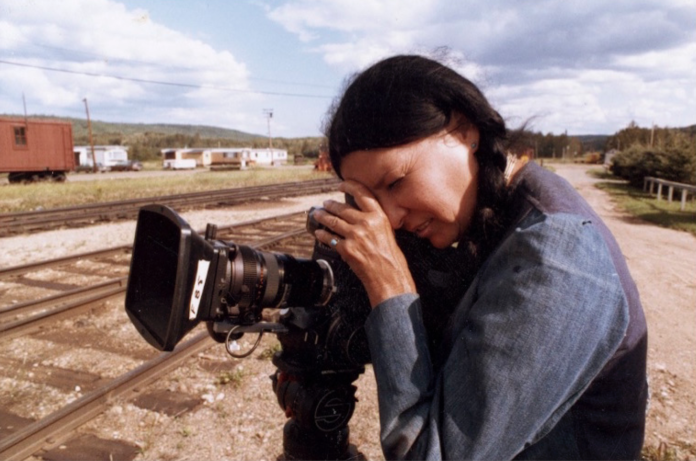The absolute highlight of last month’s 46th edition of Toronto International Film Festival was the 19-film tribute retrospective celebrating the legendary career of pioneering filmmaker, writer, singer and activist Alanis Obomsawin. That’s saying a lot, given that TIFF hosted North American premieres of some of the most desired cinematic events of the year, including Jane Campion’s The Power of the Dog, Edgar Wright’s Last Night in Soho, Céline Sciamma’s Petite Maman, and Denis Villenueve’s Dune.
Co-presented by the National Film Board, the tribute’s curation draws from a wealth of material. The now 89-year-old Obomsawin, a member of the Abenaki Nation, has directed 53 films over the past 54 years—and has eight short films in the works! While her work was virtually unscreened here in the States, it was shocking to discover that the Canadian Broadcasting Corporation (CBC) has neglected to give Obomsawin’s work the respect it deserves throughout much of her career. When the channel screened her most well-known and celebrated feature Kanehsatake: 270 Years of Resistance (1993), which documents the 1990 Kanienʼkehá꞉ka uprising, the CBC expected her to “slice 30 minutes from the two-hour film to make room for commercial breaks.”
The power of Obomsawin’s cinema speaks volumes, and not only to her interminable commitment to the communities she documents (the filmmaker’s first passion was educating children about Canada’s Indigenous peoples.) Her body of work feels just as crucial to the history of documentary cinema.
A wonderful place to begin for a newcomer to Obomsawin’s immense career is be her intimate 15-minute portraits, Puberty (1975) Part One and Part Two. The shorts profoundly explore the life of Marie Leo, a woman from the Sto:lo nation, who was adopted into a Líl̓wat family as a baby. Another remarkable gem is the politically-combustive Incident at Restigouche (1985), a courageous 45-minute, cinéma vérité account of the Quebec Provincial Police (QPP)’s raid of the Mi’kmaq’s Restigouche Reserve over salmon fishing rights. Vigorously hypnotic and on par with Barbara Kopple’s Harlan County, USA (1976), this is the kind of cinema that stays with you forever after watching it just once. Most, if not all, of Alanis Obomasawin’s films are now finally available to stream for free at the National Film Board’s website.
Another legendary Indigenous/Canadian filmmaker, Zacharias Kunuk, was celebrated at this year’s TIFF with the 20th anniversary of his earth-shattering debut feature film Atanarjuat: The Fast Runner (2001). Not only was Atanarjuat the first feature film made entirely in the Inuktitut language (and made by an Inuk), this epic 172-minute masterpiece was named “the greatest Canadian film of all time” by respondents to the 2015 TiFF poll. Kunuk premiered his latest achievement this year: Angakusajaujuq: The Shaman’s Apprentice, a stunning 20-minute, stop-animation (in the style of LAIKA Studios), that won Best Canadian Short at this year’s festival. Exploring the traditional Inuit role of the shamen, the film gloriously follows a grandmother and granddaughter as they travel to the underworld in an effort to heal an ailing young hunter. Kunuk also made a children’s book adaptation that published in both English and Inuktitut, with the latter edition winning the 2021 Indigenous Voices Award for work published in an Indigenous language.
Perhaps the festival’s biggest surprise was Danis Goulet’s post-apocalyptic Night Raiders (Canada/New Zealand) that not only sported Taika Waititi as an executive producer (!), but also won Goulet the festival’s Emerging Talent award. The Cree-Métis filmmaker wrote and directed this stunning 2043 dystopian look at a war-ravaged North America. Goulet has stated that she was inspired in part by Alfonso Cuarón’s Children of Men (2006), the Idle No More Indigenous sovereignty protest movement, as well as by the brutal military response to the Dakota Access Pipeline protests on the Standing Rock Indian Reservation.
Actor-director Elle-Máijá Tailfeathers is perfectly cast in Night Raiders‘ lead role as Niska, a Cree woman who is attempting to exist and protect her daughter from both the military occupation and the resistance movement. Amanda Plummer, Alex Tarrant, and Violet Nelson (the latter being the memorable star of Tailfeathers’ own film The Body Remembers When the World Broke Open) all give poignant performances. Goulet’s intricate, immersive world not only feels lived-in — the succinctly well-written script gracefully interweaves intersectional politics into each twist and every character. This low-budget treasure is as excitingly subversive as George Tilman Jr.’s adaptation of Angie Thomas’ YA novel The Hate U Give (2018) and is one of the year’s most interesting independent visions. Seek it out at all costs.
Jesse Hawthorne Ficks is the Film History Coordinator at the Academy of Art University in San Francisco, teaches adjunct at Chapman University, is part of the San Francisco Bay Area Film Critics Circle and curates/hosts “MiDNiTES FOR MANiACS,” a film series celebrating underrated and overlooked cinema in a neo-sincere manner.





